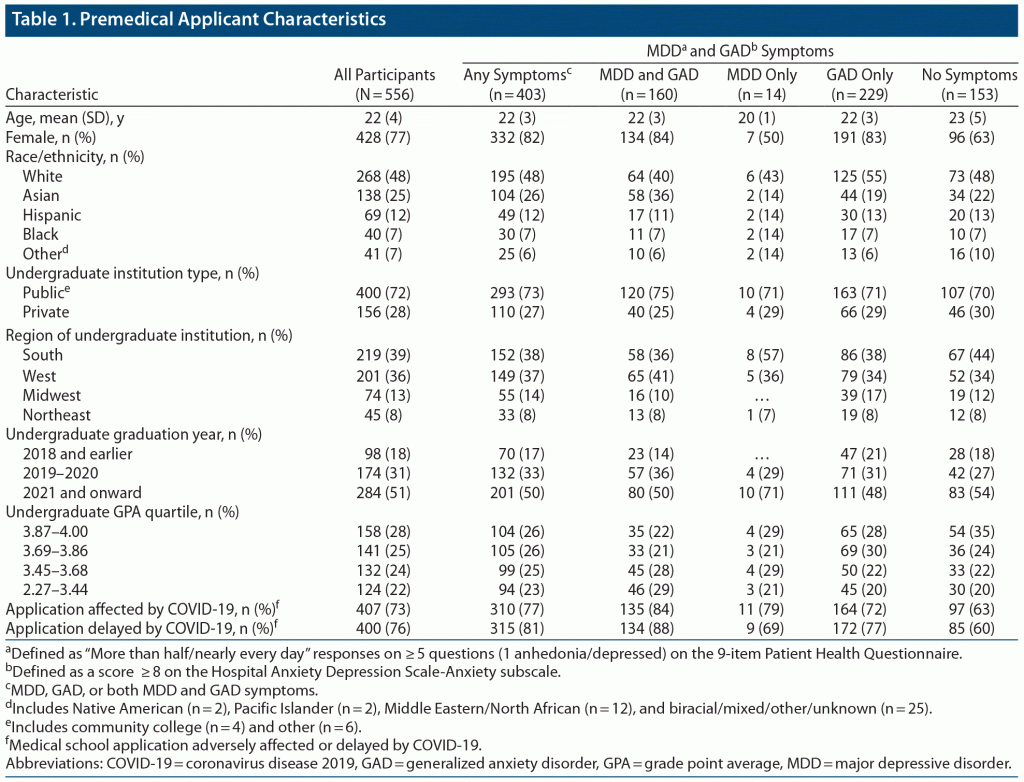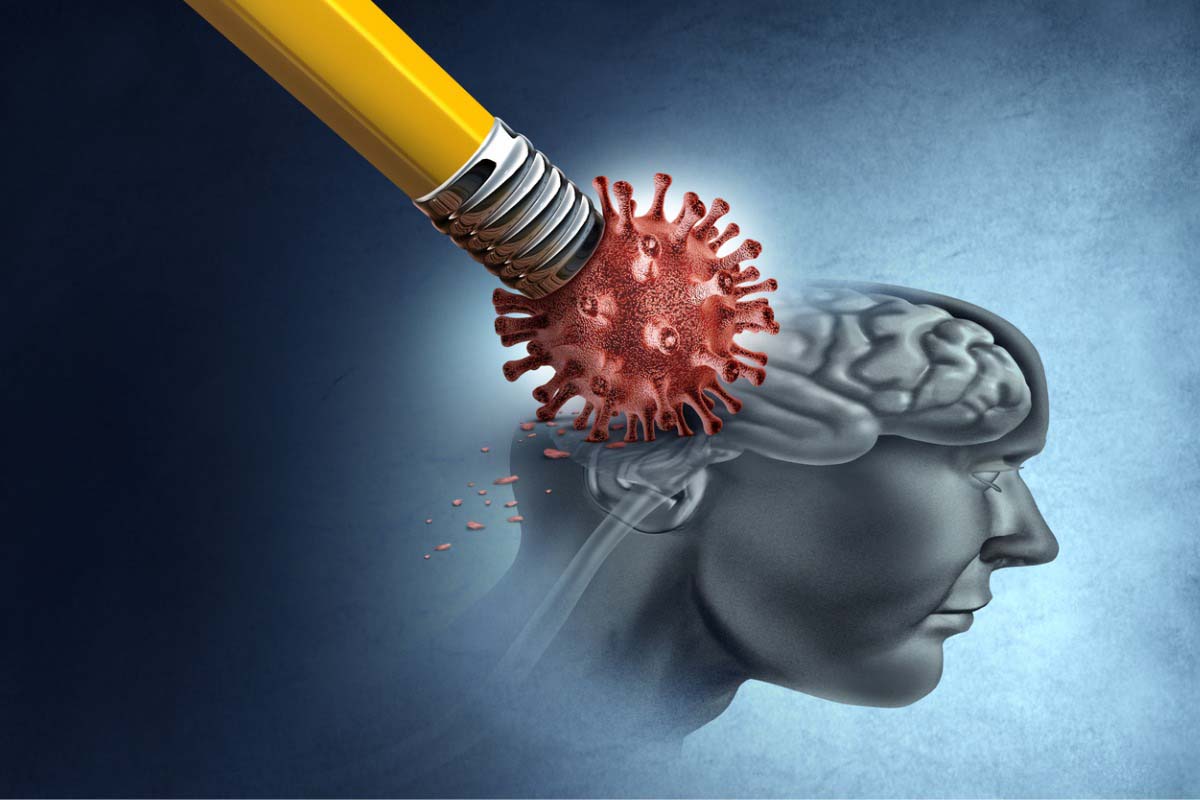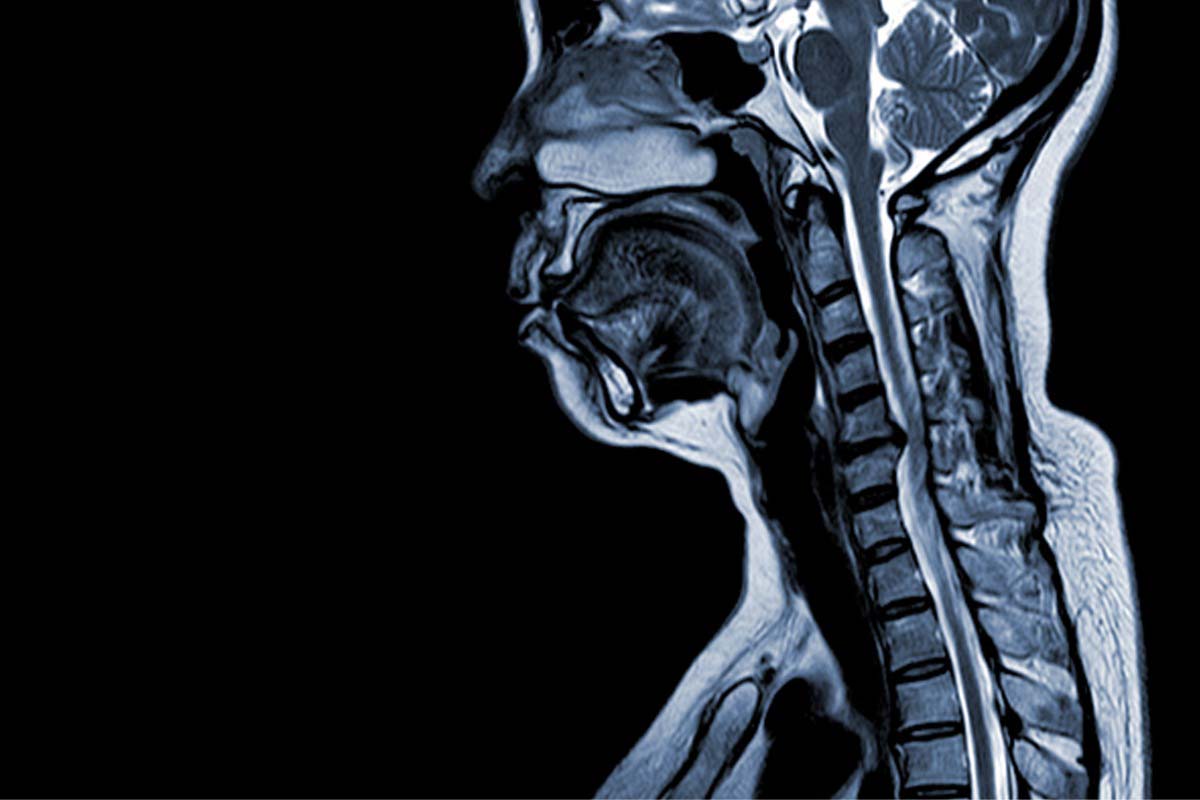
Prim Care Companion CNS Disord 2021;23(5):21br03024
To cite: Light MP, Gunge D, LaBuzetta JN, et al. Mental health symptoms among US medical school applicants during the COVID-19 pandemic. Prim Care Companion CNS Disord. 2021;23(5):21br03024.
To share: https://doi.org/10.4088/PCC.21br03024
© Copyright 2021 Physicians Postgraduate Press, Inc.
aDivision of Pulmonary, Critical Care and Sleep Medicine, Department of Medicine, University of California San Diego, La Jolla, California
bPulmonary Critical Care Section, Veterans Affairs San Diego Healthcare System, La Jolla, California
cDivision of Neurocritical Care, Department of Neurosciences, University of California San Diego, La Jolla, California
*Corresponding author: Matthew P. Light, MD, Division of Pulmonary, Critical Care and Sleep Medicine, University of California San Diego, 9300 Campus Point Drive #7381, La Jolla, CA 92037 ([email protected]).
The coronavirus disease 2019 (COVID-19) pandemic, and the measures taken to contain it, has complicated the already stressful medical school application process. To evaluate its impact on depression and anxiety, we disseminated a survey to applicants using popular social media platforms.
METHODS
We distributed an anonymous, web-based survey to pre-health applicants via Facebook, Twitter, Reddit, Slack, and college/university pre-health advisors (Supplementary Appendix 1). Survey items addressed the COVID-19 pandemic’s impact on medical school applications and evaluated for depression and anxiety symptoms that could affect applicants’ motivation and performance (Supplementary Appendix 2). Major depressive disorder (MDD) and generalized anxiety disorder (GAD) symptoms were evaluated using the Patient Health Questionnaire (PHQ)1,2 and Hospital Anxiety and Depression Scale–Anxiety subscale (HADS-A), respectively (Supplementary Appendix 3).1,3 The associations between MDD/GAD symptoms and anticipated COVID-related application delays were evaluated using χ2 tests, and factors associated with MDD/GAD symptoms were evaluated using multivariable logistic regression. The University of California San Diego Institutional Review Board approved the study, and all respondents provided informed consent.
RESULTS
Of 735 surveys collected, 712 (97%) were complete, of which 556 (78%) were from medical school applicants completing the mental health assessments and representing 43 US/Canada states and provinces and 180 colleges and universities. Applicants’ mean ± SD age was 22 ± 4 years, 77% were women, 12% were Hispanic, 7% were Black, and 51% planned to graduate from college/university in 2021 or beyond. Overall, 73% (n = 407) of respondents indicated COVID-19 had adversely affected their medical school applications, with 76% (n = 400) anticipating COVID-19–associated application delays (Table 1).
Regarding mental health, 31% (n = 174) and 70% (n = 389) reported MDD and GAD symptoms, respectively; 29% (n = 160) reported both; and 92% (n = 160) of 174 respondents with MDD symptoms had comorbid GAD symptoms (Supplementary Figure 1). Notably, 11% (n = 60) reported suicidal symptoms several days and 5% (n = 29) more than half or nearly every day each week.
Among respondents with MDD and GAD symptoms, respectively, 103 (59%) and 197 (51%) reported COVID-19 pandemic–associated delays or new uncertainty regarding their application timeline (versus unaffected or accelerated timeline, P < .01). In multivariable regression, female sex (odds ratio = 2.70 [1.73–4.20]) was associated with MDD and/or GAD symptoms, while race and undergraduate characteristics (graduation year, institution, grade point average) were not.
DISCUSSION
This survey demonstrated an alarmingly high prevalence of depression and anxiety in a diverse population of medical school applicants. Notably, 31% of applicants reported MDD symptoms, which is more than twice that in a similar cohort a decade ago (15%).1 Additionally, 70% reported GAD symptoms, which far exceeds the findings of 12%–22% reported previously in large, national mental health surveys.4,5
Medical school applications have surged during the COVID-19 pandemic6—consistent with rising interest in the profession and despite concerning population-level mental health trends.7 However, we observed a cross-sectional relationship between MDD/GAD symptoms and COVID-associated application delays. While appearing discordant, these findings more likely highlight a previously unidentified applicant subpopulation whose mental health symptoms render them vulnerable to stressors that may jeopardize their career plans. Follow-up surveys may identify those at risk for downstream mental health impairment, burnout, and suicide.
Limitations to our study include its cross-sectional design and “snowball sampling” method, which is vulnerable to nonresponse bias. We designed our approach to minimize bias by targeting college-age applicants, a population with high social media use. Moreover, the large percentage of female respondents may have skewed our results; however, we believe this effect is modest and highlights a population likely to report psychiatric symptoms and to respond to surveys, as noted in prior research.1
In conclusion, our survey reveals concerning levels of depression and anxiety symptoms among premedical undergraduates, which may be associated with delays and uncertainty surrounding medical school applications. Record applicant numbers may be misleading and neglect a subpopulation of qualified applicants whose careers may be jeopardized by debilitating mental health symptoms.
Received: July 21, 2021.
Published online: September 30, 2021.
Potential conflicts of interest: None.
Funding/support: This work was supported by the Department of Veterans Affairs (salary support and VA Merit Award 1I01BX004767, PI: Dr Crotty Alexander) in La Jolla, California and NIH NHLBI (R01 HL137052-01, PI: Dr Crotty Alexander) in Bethesda, Maryland. Dr Kamdar is currently supported by an NIA/NIH Paul B. Beeson Career Development Award (K76 AG059936, PI: Dr Kamdar) in Bethesda, Maryland.
Role of the sponsor: The supporters had no role in the design, analysis, interpretation, or publication of this study.
Supplementary material: See accompanying pages.
References (7)

- Fang DZ, Young CB, Golshan S, et al. Depression in premedical undergraduates: a cross-sectional survey. Prim Care Companion J Clin Psychiatry. 2010;12(6):PCC.10m00958. PubMed
- Kroenke K, Spitzer RL, Williams JB. The PHQ-9: validity of a brief depression severity measure. J Gen Intern Med. 2001;16(9):606–613. PubMed CrossRef
- Olssøn I, Mykletun A, Dahl AA. The Hospital Anxiety and Depression Rating Scale: a cross-sectional study of psychometrics and case finding abilities in general practice. BMC Psychiatry. 2005;5(1):46. PubMed CrossRef
- Blanco C, Okuda M, Wright C, et al. Mental health of college students and their non-college-attending peers: results from the National Epidemiologic Study on Alcohol and Related Conditions. Arch Gen Psychiatry. 2008;65(12):1429–1437. PubMed CrossRef
- National Comorbidity Survey (NCS). Harvard Medical School. NCS website. Accessed August 31, 2021. hcp.med.harvard.edu/ncs/index.php
- Weiner S. Applications to medical school are at an all-time high. What does this mean for applicants and schools? AAMC website. Accessed August 31, 2021. aamc.org/news-insights/applications-medical-school-are-all-time-high-what-does-mean-applicants-and-schools
- Ettman CK, Abdalla SM, Cohen GH, et al. Prevalence of depression symptoms in US adults before and during the COVID-19 pandemic. JAMA Netw Open. 2020;3(9):e2019686. PubMed CrossRef
Enjoy this premium PDF as part of your membership benefits!






